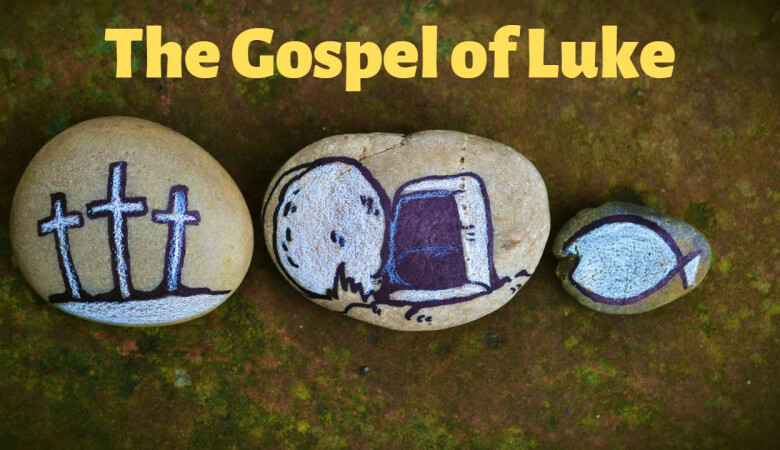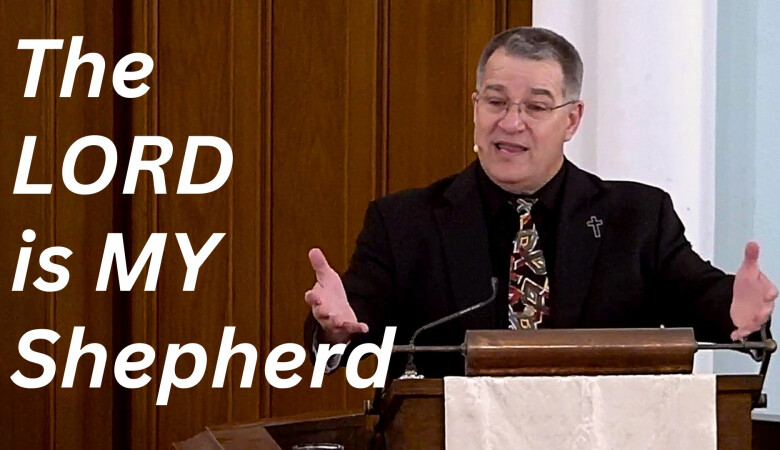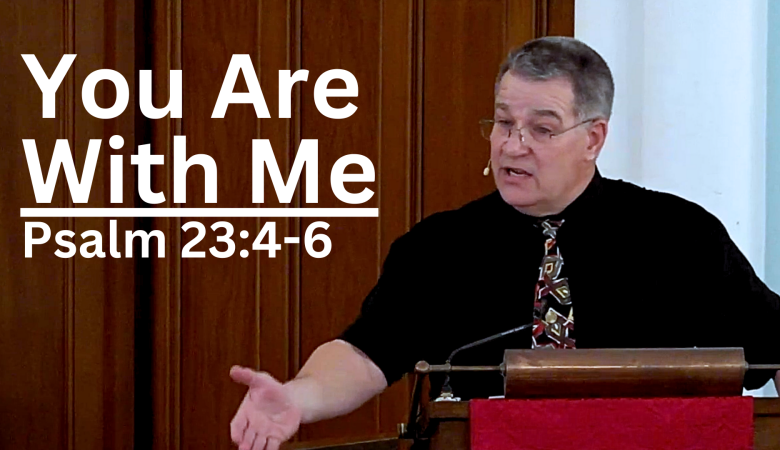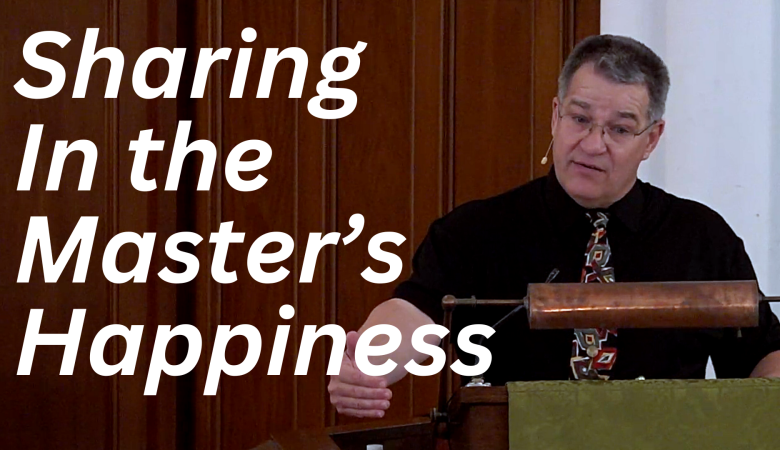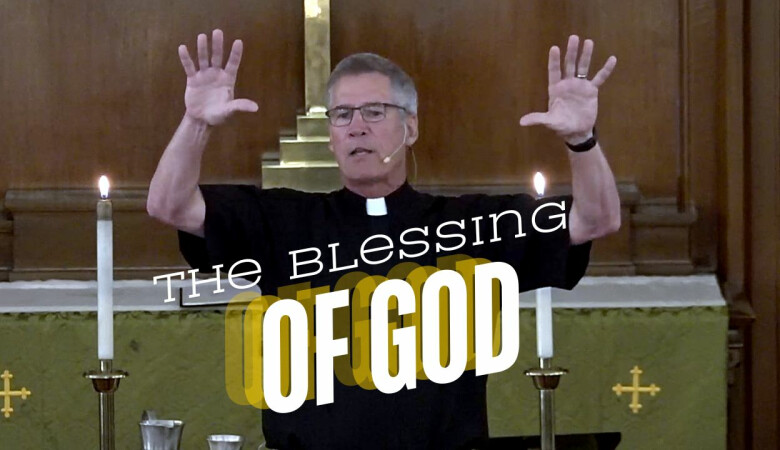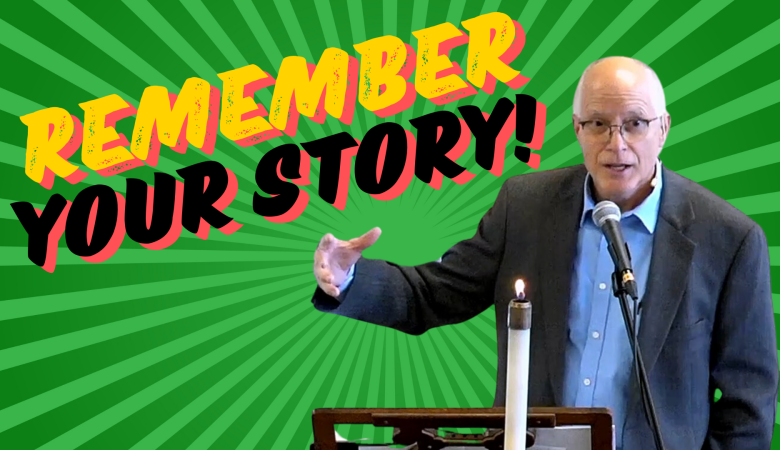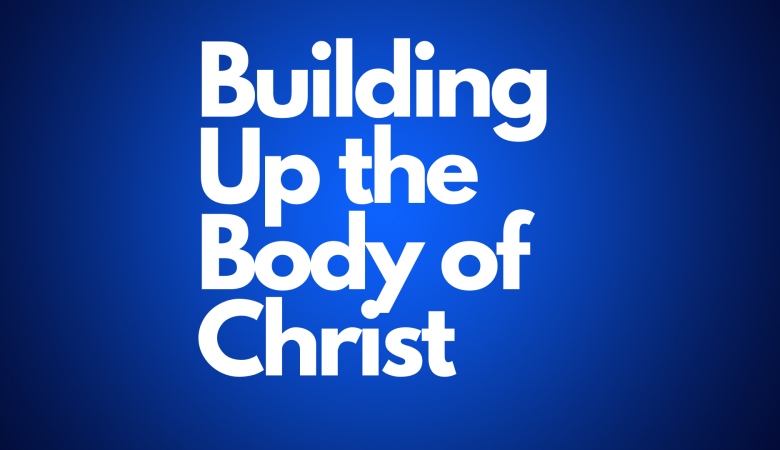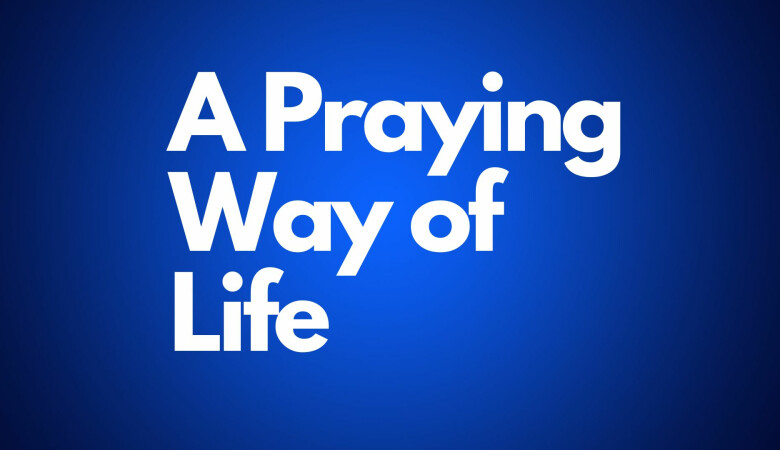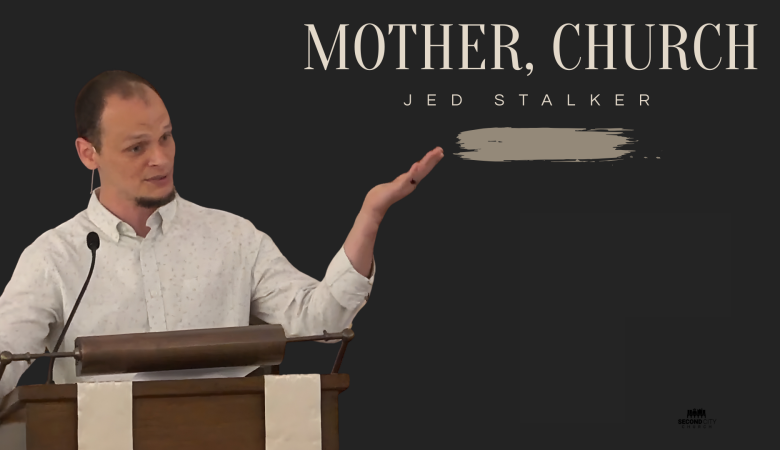Series: Guest Preachers
Trusting God in Honest Lament
July 21, 2024 | Andy Phillips
Passage: Psalms 13:1-6
ALL SERMONS IN SERIES
Summary
How do we trust God in the midst of life’s challenges? The book of Job tells us our hope is ultimately anchored in God showing up and not in figuring out what God is doing or even in answers to our prayers. We maintain and even grow in trust as we wholeheartedly communicate our pain and suffering through lament and affirm our trust in knowing the love of Christ.
Transcript
Our father, we are so thankful for your goodness and grace to us. We are thankful that you have come to us in Jesus, that, uh, you are with us, and we pray that you would move in our hearts this morning. Might you encourage us? Might the reality of your loving presence and grace in Jesus, uh, be a parent, be real, and be that which strengthens and encourages us? And we pray this in Christ's name. Amen. Uh, I always say it's good to be with you when I'm here, but that's. It is good to be here. It really is. I enjoy, um, being this church, the uniqueness of it. I get to hop around to a lot of different churches, and there is a tenor, a flavor here that is refreshing. The authenticity is encouraging. And, um, I'm just so very thankful for second city church. Um, a lot of history here. Was the interim pastor here about ten some odd years ago and right before Peter came, and then ended up, uh, being, uh, involved with the school, but happy to be here. Big part of things, the school project really is. Couldn't happen without you all. And, uh, I'm so, so very thankful for you, as is the rest of our team. One of the things that has been part of my journey through this adventure with the school is learning how to trust God. Um, I thought I knew how to trust God. I thought I knew what trusting God and faith in God meant. Um, but, um, there's been several, uh, challenges, uh, that I faced, um, challenges of prayers that God should answer and doesn't, challenges, uh, of having a number of people in our lives, lenders in my life, uh, that are facing terminal illness. And, um. So what does it mean to trust God? I was talking with, uh, the mom or the wife of, uh, one of these families. Her husband has terminal brain cancer. And I reminded her of the truth of the gospel. I reminded her that, uh, don't forget God loves you. He's with you. He has you. The, uh, great promise through all the scriptures. And she looked back at me, hardly a, uh, hesitation, and said, it doesn't feel that way at all. And I was kind of, uh, I was kind of startled because she was really, really honest. That's how she felt. And I'm tempted to say, you know, my theological hat is whirring. And I'm tempted to say, you know, you can't trust your feelings. You know, what's the truth of the gospel? Lean into that. Remember the cross, your baptism. Trust goddess. But what I failed to recognize at that time is that she was in good company expressing that, uh, she joins, uh, the psalmists who trust God through honest lament or a genuine complaint or passionate expression of grief. She's like job, as we've seen, and we'll see. Or the opening verses of psalm 13. How long, lord, will you forget me? Forever. Wow. It doesn't sound like that person has much faith, right? Somebody said that to us. How long will you hide your face? Or perhaps lines from as many as 58 of the other psalms of lament, 58, in which the authors say, in effect, what is going on? Where are you? Psalm 89, one of my favorite psalms. Long psalm. Read it sometime. The first part, you're going, yeah, right on. God's faithfulness, God's loving kindness. And then that psalm finishes with, God. You've lied to us because David isn't on the throne. Things are falling apart. Some 58 psalms in which the author says, in effect, where are you? Why have you forgotten me? Or as you saw a few minutes ago, the disciples in the boat, they run to Jesus. Don't you care that we're drowning? There are all kinds of interesting things that come out of that, but not enough time to get into that. Even Jesus words on the cross, my God, my God, why have you forsaken me? And what's interesting and what, as I've reflected on this, and particularly with help from the book of Job, these are all expressions of trust. Trust in honest lament. And frankly, that's how we feel, isn't it? I know that's how this wife felt. You've forsaken me. Where are you? Why don't you answer? Why do you stay silent? Why do you fuse to answer? Don't you care? A guy by the name of John Selwood says that we have become so good. And he coined the term. Ah, spiritual bypassing. We spiritualize things to avoid dealing with human emotions, human feelings, which is something the psalmist never do. We say things like, he's in a better place. God has a plan. All things work together for good. And none of those things are wrong. Those things are all biblical. But the problem is, these statements are true. But we can use these truths to bypass the reality of our human emotions and feelings. And frankly, it's a bit disingenuous. Over one third of the psalms refuse to spiritually bypass, but instead trust God through honest lament. And if we are going to trust God through honest lament, the first thing we need to do is take a closer look at what it means to trust God. We sort of assume we know in that famous proverbs passage. We're going to look at the first half today, and then in August when I return, you get the second half. So some suspense for you. Um, trust the Lord with all your heart and do not lean on your own understanding. Do not lean on your own understanding. What we learned from this passage is that trust in God is an ongoing exercise, a repeated decision of intent. And that's really. We, uh, see that in the psalms, especially psalm 56. When I am afraid, I will put my trust in goddess. The assumption is I'm going to be afraid. But when those times come, I will put my trust in God. So there's an intellectual component, if you will. I will put my trust in God. Um, the famous, um, commentator from the book of psalms, Derek Kidner, says that trust is seen here as a deliberate act in defiance of one's emotional state. This morning I got up early to kind of finish up things. I was scrambling around this weekend, so didn't quite get as far as I wanted to get. And, uh, so I sit down, pull up, made the big mistake of opening my email. Never do that. Never do that before. You're trying to get.
And I got two emails that just stirred angst in me. It's that, you know, that rumbling in the pit of your stomach, that emotion. And I'm struggling with that. I'm going, I'm preaching on trust. And this angst is overtaking me. And it's. And so these words, these words come back to me. They come, um, when I'm, in my case, in angst, I put my trust. I put my trust. So it's an intellectual component, but it's not simply intellectual. And that's the point of the proverbs passage, with all your heart, your entire being, your emotion, intellect and emotion, which is why we see that honest lament is such an important part of trust. And this is where Job is especially helpful. You all know the story of Job. It's pretty familiar. M even people not particularly associated with the church know about Job. They know that Job was this flourishing man with a great family, great career, great. Everything was taken from him. Everything. And then he's inflicted with boils. And then there's this great statement of faith in Job three. He says this. The scriptures say this about Job. In all this, Job did not sin by charging God with wrongdoing. These are Job's words, shall we accept good from God and not also trouble? And at the end of the book, unlike Job's friends, God says this about Job, that he had spoken the truth about him so you'd think, those of you that are all familiar with the book of Job, that the book of Job would have a very different flavor than the, uh, words that we read earlier in this service. Listen to Job. I cry out to you, God, but you do not answer. I stand up, but you merely look at me. You turn on me ruthlessly with might of your hand. You attack me. I cry out to you, God, but you do not answer or stand up, but you merely look at me with the might of your hand. You attack me. That is characteristic of Job's petitions in 30 some chapters. And there's two very important points here. Number one, Job's trust is expressed in emotional, passionate, honest lament and complaint. He laments that he's being treated unfairly, contrary to his theology. His theology said that it is the wicked people that are cursed. And Job says, like me, I'm blameless. I should be blessed. Why is this going on? And his counselors push back at him. Job says, my theology said, uh, this shouldn't be happening. He laments that he can't figure out what God is doing. In fact, the book of Job seems to go out of its way to put us or even confuse us in terms of what God's doing. You remember the background? It's kind of a bet with the devil. The devil bets God that Job is just hanging on because of all the good stuff he has. Curse him. Um, inflict him and he'll curse you. He laments repeatedly that God won't give him a, ah, hearing. So it's important to recognize that the book of Job is this honest lament. But Job's trust in God is expressed and seen in his hope, in his confidence that God would show up, God would give him relief. And what's fascinating is Job's hope is not anchored in answer to prayer. In fact, Job never asked God to fix his problem, never asks God to heal him. And it's not that we shouldn't ask those things, but that's not where Job's hope is anchored. It's anchored in God showing up. Read a post recently that said, the reason I trust God is because God has answered all my prayers. And I read that, and I kind of had this. Ugh. I, uh, guess it depends how you define answered prayers, but most of us, if we're being honest, would say, no. God doesn't always answer our prayers. He doesn't always fix my marriage, uh, the marriages. He doesn't always heal my disease. He doesn't always provide funding. When I think I need it for the school. A lot of caveats and all that. I understand that. But trust in God is anchored not in the fact that he will answer prayers, and our hope ultimately is in the answer, not in God himself. Job's hope is fixed. He's passionate about God showing up, God giving him a hearing. He does say, in my flesh, I will see God. He is confident of that. But it's in the context of Joe's lengthy lament, some 30 chapters of passionate complaint, passionate lament that we see as hope and his trust. Not that God's going to fix his life, but that God's going to show up. Another important part of that is that one of the answer to job came in the form of God showing up. But his answer, and, uh, the way God showed up was to ask him repeated questions over and over again. God reveals himself to us, and oftentimes, at least in my mind, I want to dictate how God will answer, how God will show up, what God will do. Sometimes that's because that's the way he's done in the past, and other times it's the way I think he should act. But God showed up to job in a very different and unexpected way.
So let's look at psalm 13, because psalm 13 is very typical of your lament. And I think there's a number of things that are helpful for us in learning to lament. In learning to trust God and honest lament, it means, first of all, that you turn to God. Now, this seems pretty obvious, but not necessarily so, at least not for me. Uh, my angst this morning, my immediate response was to, oh, I got to respond to these emails. Oh, I wonder if this. I wonder if that. That's my immediate response. And with bigger things, it tends to be that way. And yet the psalms of lament, like psalm 77 one, like psalm 13, means turning to God. Listen to psalm 77 one. I cried out to God for help. I cried out to God to hear me when I was in distress. I sought the Lord. At night. I stretched out untiring hands. I would not be comforted. It seems obvious, but in tragedy and trauma, it's often the last place we go. And what's interesting about job, 58 times. I don't know who figured this out and who counted it, but I've seen it twice in, uh, different, uh, commentators, um, 58 times. Job speaks to God, his friends, his advisors, his counselors, not once. His counselors speak about him a lot, but never to him. Job speaks to him. So we speak to God. We turn to God. And second, and this again, is a statement of the obvious, perhaps, but it's one of the things that is very difficult to do. It means you complain to God. I. That's hard. That's hard. First, three verses of, uh, psalm 13. Again, very typical of a psalm of lament. How long, lord, will you forget me forever? How long will you hide your face? How long must I wrestle with my thoughts? Day after day, sorrow is in my heart. How long will my enemy triumph over me? He is issuing his complaint. He's voicing his complaint. Remember the words. You just look at me. Why do you torture me? Why won't you answer? And this is vital because in the complaint is the connection to God. We've got a quote from John Calvin, I think. Uh, he's referencing, uh, it's out of his commentary to Joshua, but he says this, um, it's in the front of your bullet. And in part, um, he cries out that God did not regard him. And yet by this very complaint, he gives evidence that faith enabled him to rise higher and to conclude, contrary to the judgment of his flesh, that his welfare was secure in God's hand. What he's saying is his very complaint is connected to God. Is a connection with God. It's very complaint that God has forgotten. It keeps him connected. Uh, his disciples, when they go to Jesus in the boat, don't you care? Is some degree, some form of expression of trust that they obviously thought Jesus could do something. The text tells us they were utterly shocked at what he did do, but they thought somehow he should do something. It was that connection. I had a member of my church who said to me and, um, may have mentioned this. It's one of my, uh, I talked to her about this all the time, but she told me at one point early on, as she was saying, uh, before she joined the church, she said, I was going to be an atheist, but I was afraid God would smite me. That is the most unatheistic statement you could make. Right? And that's a bit of the irony of what a complaint is about. You complain to somebody that you know is there, you voice a complaint. It really is an expression of trust. Complain to God, maintains your connection with Goddesse. And sometimes we need to live there for a while. I know this wife needed to live there for a while, but the point is she's still connected. She's the same lady who told me, I am really mad at God and didn't even finish the sentence without going on to say, but I don't know how people go through something like this without him? You see those two things? They're here in job. They're through all the psalms of lament. That's what it means to trust God. And honest lament, it means asking God for what you want. But your anchor, your hope, is in intimacy with God or with God showing up with God's face no longer being hidden. The psalmist in verse three, psalm 13. Lord, my God, look on me. My God, look on me. Intimacy give light to my eyes. Not really certain what that means. It may mean keep me from death, but that's the petition there. That's the petition. And when you look at all the psalms of lament, what's fascinating is there is so little in terms of specific or explicit supplication or petition. They're almost always made up of where are you? Show up. Answer. And those three people I mentioned, uh, battling with terminal illness, one actually died this week. But all three of them were marked by three different things. Number one, all three of them just have this incredible perspective of gratitude. So thankful. And, uh, all three of them have various levels, various degrees of christian faith, but they are overwhelmingly marked with a sense of gratitude. And secondly, all of them, to varying degrees, have a longing for God. There's a longing for God himself. And third, I'm struck by how infrequently they pray or ask to be healed. Struck by that. There's nothing wrong with that. And, uh, the one person tells me quite readily, I'm not sure that I really don't think God's going to heal me at this point, but I ask because he tells me to. It's a great perspective, but they're leaning into the comfort of the reality, of the presence of God with them.
They're lamenting. And then the last verse of psalm 13, verse six. Listen to the language and notice the tenses, the grammar. But I trusted past tense. In your steadfast love, my heart shall rejoice in your salvation. I will sing to the Lord. Because he has dealt past tense bountifully with me. There's this past tense and future tense, I trusted in your stead, not I am trusting now, but I did. He has dealt bountifully with me. He's anchored ultimately in God's covenantal love, that steadfast love, past tense. He knows there was a time when that held him, and perhaps it's not holding him as it did then, but he reflects on that past tense. But there's this hope, this assurance that he will rejoice. That he will celebrate, that he will sing. I, uh, love the authenticity of that. There's this note of trust, not perhaps where he is at that moment. And there's this future confidence. And that's what it looks like to hope, to trust in God, in honest lament. Reflect on what God has done, his trust in the past. And we have so m much more because of Jesus, because of the cross. Look at what we have. We reflect back when things come upon us. There's lots of things going on, and we can conclude a lot about what God is doing. But one thing we are guaranteed by the cross is that God is smiling upon us. His face is turned towards us, giving us peace. He is keeping us. The promise of God in Jesus Christ is that his love will pursue us. His love will never leave us. And so we look at that. We see that when we're overwhelmed, we may not be there. We may only be able to go so far as God. I trusted last week in your steadfast love. Not there. Now I'm really struggling, but I will. I will sing. I will celebrate. You have dealt bountifully. You cannot understand the cross of Jesus Christ and not understand or be touched in some capacity with a bountiful love of God for us. You cannot. Do you understand what God has done in the flesh, coming in the flesh, suffering on the cross to rescue us from our sin. That's our anchor. We lose sight of that. And in the midst of lament, we forget that we have that in the back of our mind. God, I remember that you dealt bountifully with me, and I trusted that last month. I'm m not there today. I'm struggling. Our hope and anchor is God showing up. We pray, we petition, we ask. But ultimately what we need is the shalom of God, that sense of well being that comes through the presence and work of God by the Holy Spirit, our comforter, with us. You know, I've had, um, I've talked, I know I've mentioned it in sermons here before. I've mentioned it a lot, but I had a 03:00 a.m. moment. That's, many of you have those. You wake up in the middle of the night and your brain starts going and the angst can build. At least it does for me. I've gotten much better. And some of the stuff I'm talking about has helped immensely. But I, uh, think a year or two ago, I had this incredible sense of God's loving presence. Middle 03:00 a.m. i was beside myself was going to wake up Linda. I don't know what she would have done, but I would have felt better by disturbing her, too. But this angst, this just near panic, and this sense of God's loving care that he had me, it, uh, was felt, and I just. Nothing changed. But I was able to climb back in bed and go right to sleep, and I'm going, man, that's what I need. That's what I want. A bottle. And the frustrating thing. I don't know what button to push to get that. What's interesting is that, like, in job's case, it comes. The shalom of God comes. It's promised. In the benediction, it is promised that God will keep you, that God, his face is shining upon you, that he's turned his face toward you, giving you peace. But how that comes and to recognize that and to be able to take a deep breath. And this morning, as I'm working on the sermon and pushing off this angst, uh, on the way up here, I went, oh, the angst is gone now. Uh, maybe it was because I had a second cup of coffee. I don't know. But there is a sense of well being that God has me. Don't downplay that and recognize that it is God's presence that brings us comfort.
Don't be afraid to complain. Don't be afraid to complain to God. It's hard. I tried it. It's really hard for me to complain to God. Maybe it's not for you, but I find it incredibly difficult. She's a retreat leader. Name's Paula Darcy. I'm nothing all that familiar with her, but I stumbled across this. She had, uh. She talks in this brief, uh, article about how she was transformed by the deep grief of losing her husband and daughter to a drunk driver. You know, horrific, horrific stuff. But this is what she says. One of the things I confronted was my idea that the proof of a loving God was when things in your life, or favorable, you know, that is so much, so much of what drives us. God loves me because things are going well. But she goes on to say, but in the face of my loss and all that had happened, something in me could not deny that God was nevertheless loving and with me. She says that was a considerable shift in her awareness, something inside her, nevertheless. And all three of those people I mentioned, all that's going on is horrible as that. What's going on? There is something in them that they could not deny, that God was loving them. And with them, that's what the cross assures us of as we partake in the table in a few minutes. That's part of what that helps strengthen us to grasp and live into. We trust God through honest lament by turning to God, complaining to God, looking to God himself as our hope and comfort. And then we're honest with our struggles, but anchored in the loving kindness of God, as demonstrated so clearly through Jesus on the cross. Let me pray for us. Father life is filled with challenges. I'm, uh, sure there are folks here this morning that are just overwhelmed with angst, and if not angst, dealing with terrible, terrible difficulties. And it's in those times that you seem so far away, you don't seem to hear us when we pray, you don't seem to respond. We want to sense your comfort, your love by your holy spirit, which you have given and promise. And at times, we just don't have that sense. And might you grant us the grace to be, um, so transparent that we express our complaint to you, that we turn to you, first of all, that we're honest with you, that we express our heart to you and never lose sight of your loving kindness, your steadfast love for us that's so evident and clearly displayed in Jesus Christ. And even though we may not be there in the moment, might, uh, we recognize that of those past moments and recognize that you have indeed dealt bountifully with us. We thank you for the hope, the gospel of Jesus, our comfort, our, uh, strength, and our redeemer.
Series Information
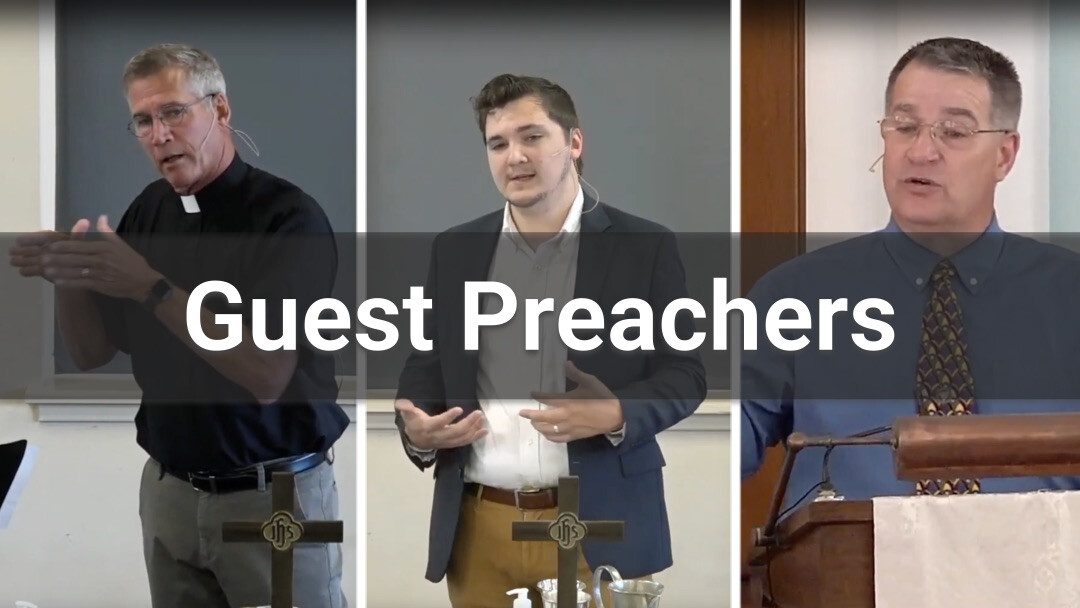
When Pastor Peter is away Second City Church is blessed to hear other men God has gifted to preach.

